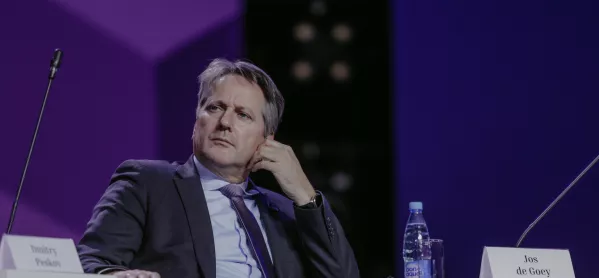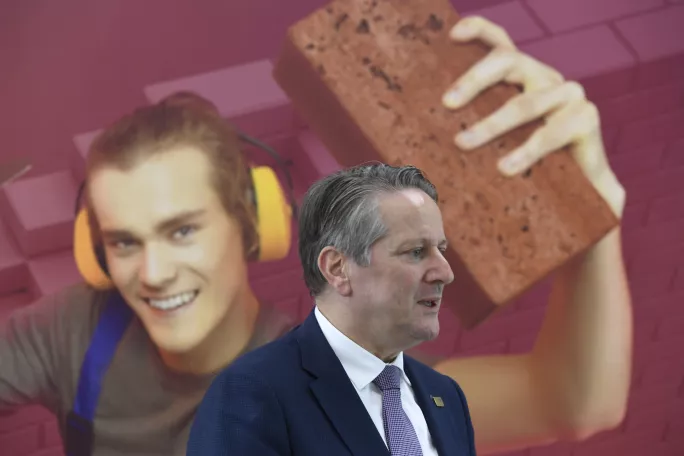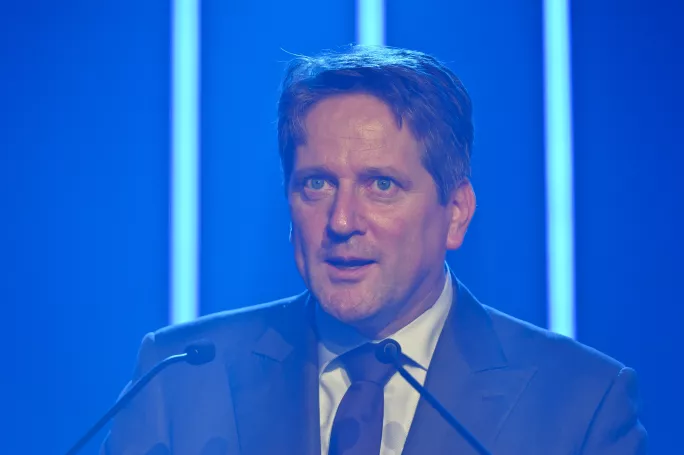- Home
- Meet the failed florist at the helm of WorldSkills
Meet the failed florist at the helm of WorldSkills

When Jos de Goey was a teenager, his life changed course. He was at college, completing his technical and vocational education and training (TVET) course in floristry when he looked around at his peers’ work.
“I was trying to make beautiful arrangements, and mine didn’t look how they were supposed to or like anyone else’s. I realised that the talent to be a florist was not in me,” he laughs.
To begin with, it seemed the obvious path to take: floristry is in de Goey’s blood. He grew up in Wateringen in the Netherlands, a town famous for its many greenhouses and dedication to horticulture. De Goey’s father owned several florist shops and garden centres in the town, and his mother took care of his father and the family. He’s one of five, with two brothers and two sisters, and it was a hectic but happy household, he says, with De Goey’s father making the most of his brood and regularly enlisting his children to help in the family business.
Background: ‘The continued growth of WorldSkills isn’t sustainable’
Tes magazine: How WorldSkills trainers could raise standards across TVET
Opinion: ‘WorldSkills heroes deserve recognition, not tokenism’
“Even when I was leaving for school, he’d be asking when I’d be home to help. That’s how I was brought up, always helping out my father, I never knew anything else. I was taught that you always needed to be busy: either at school or in the family business,” de Goey says.
“My passion for skills originated from that time. The admiration for craftsmen, for shop owners, for little companies, for the ones who don’t count the hours, who continuously work on making their efforts successful.”
De Goey dropped out of his TVET floristry course, and went to work for his father in a management capacity. After a few years, it was decided that he should break away from the company and gain experience elsewhere.
Tackling perceptions of technical education
He began work at an educational development fund, which had been set up by stakeholders and partners within the metalwork industry - a move that opened his eyes to the world of skills, and the importance of quality TVET provision. He learned about how the technical programmes are developed and promoted, and soon became aware of negative attitudes towards TVET. As a result, he made it his role in life to correct them.
“We still have this situation where parents are trying to get the highest education for their children. The whole term of higher and lower education is something which we should stop mentioning. It’s a different form of education, it’s not higher or lower. And sometimes, it better suits young people in finding their talent,” de Goey says.
“It’s obvious and understandable: you want the best for your child. Parents still think that the best for a child is a higher education pathway, but that doesn’t mean the child will be happy with that.
“My role in life is to inform parents of another successful pathway, and I’m so happy that more and more of that is coming through.”

And, indeed, his role is quite an influential one. Today, de Goey is the president of WorldSkills - overseeing a skills organisation that has 83 member countries and facilitates multi-million-dollar international skills competitions every two years. If there’s any job that can influence and shape the conversation around TVET on a global level, being at the top of WorldSkills is it.
It’s a role that’s been 20 years in the making. In 2000, when he was working for the education development fund, de Goey was asked to project-manage the national skills competitions in the Netherlands.
“That’s when the WorldSkills ball started to roll. Seoul in 2001 was my first international competition and I’ve been hooked ever since. Because I’d tried it myself and had failed, the appreciation for the young people to be able to perform on that level really blew me away,” he says.
De Goey’s passion and genuine dedication to skills was apparent, and when he returned from Seoul, he was asked to set up and lead WorldSkills Netherlands as CEO. The Netherlands has competed in WorldSkills since 1962, but the ministry decided that new structure was needed. It was introducing a wave of reforms to TVET education, and wanted de Goey to lead the new organisation into a new era.
In the Netherlands today, skills competitions are anchored in TVET programmes and are seen as a hub for the professional development of teachers and trainers. WorldSkills Netherlands is involved in the development of the curricula and pedagogical practice. De Goey is proud of his achievements at WorldSkills Netherlands, and says that the country has seen great success in how it has embedded the skills competitions into the education system - and beyond that.
“The goal is not to organise skills competitions, but to use them as a tool to foster and develop talent, to raise the quality of TVET provision, to demonstrate to parents and young people the career possibilities you can have through VET, and to implement themes like sustainability and climate change into the TVET system,” he says.
A 2020 vision for WorldSkills
In summer 2019, de Goey took over the reins as president of WorldSkills from Simon Bartley. He’s just a few months into his role and already a clear vision is emerging. A huge part of that vision centres around climate change.
WorldSkills’ global reach means that it can impress upon young people the importance of contributing towards tackling the climate change crisis, says de Goey. But he’s also got his sights set on industry.
“We need to say to the developers of the test products that everything used in every national, regional and international competition must be sustainable.
“The example given at global level influences national structures. If we have a sophisticated product in a certain trade that performs in a sustainable way, we will then see these products rolled out in 83 countries, in national systems and TVET programmes,” he says.
And at a more basic level, the competitions should be working towards being plastic-free, says de Goey. “One of the things I’m always looking at is how do other organisations take care of big events organised in an eco-friendly way. I ask myself, how can we do it? It is a major consideration for the upcoming event in Shanghai. If we don’t, there will be questions about our plastic use.”

You may expect the chief executive of a global organisation to envision his or her empire expanding. But de Goey isn’t interested in bringing in more countries underneath the WorldSkills umbrella. Instead, he wants to strengthen the WorldSkills brand, and remains unconvinced that international growth is key to this.
“A challenge is, how do we strengthen the movement without accepting more and more countries just for the sake of having more countries? How can we make our members stronger? If we can make the base stronger, the whole movement becomes stronger,” he says.
Cross-country collaboration is key to this, says de Goey. Internationally, members need to share best practice with each other. He highlights the organisation of national competitions and the test products that need to be built as part of this. These test products, he says, should be shared globally, so that each country doesn’t have to start from scratch.
He says that he wants the existing member countries to set realistic goals: not all of them are going to walk away with a medal - and there’s nothing wrong with that.
“There are so many other things you can get from participating in WorldSkills. Winning medals gives those young people a boost for their careers, but if you look at the whole process of raising the quality and attractiveness of TVET, WorldSkills does that. The countries become part of a huge network: contacts are made which continue long after the competitions.
“It’s important to participate in WorldSkills and EuroSkills because it influences the national structure and gives young people the opportunity to step into programmes. ” he says.
De Goey always comes back to increasing the opportunities for young people - and to improving the global attitude towards TVET. The day before our interview, he met Nicolas Schmit, EU commissioner for employment, social affairs and inclusion.
“He told me that he knew about EuroSkills and WorldSkills and supported the mission. And I thought, ‘OK, that’s someone who I don’t need to convince about the power of WorldSkills.’ That’s definitely changed. Twenty years ago it was a closed circle, but now we’re known,” he says.
And de Goey plans to go on being the leader of that mission for a long time.
“This has become so much a part of my life. You can never predict the future but I’m not done yet. My ambitions for WorldSkills are not finished,” he says.
Keep reading for just £1 per month
You've reached your limit of free articles this month. Subscribe for £1 per month for three months and get:
- Unlimited access to all Tes magazine content
- Exclusive subscriber-only stories
- Award-winning email newsletters



